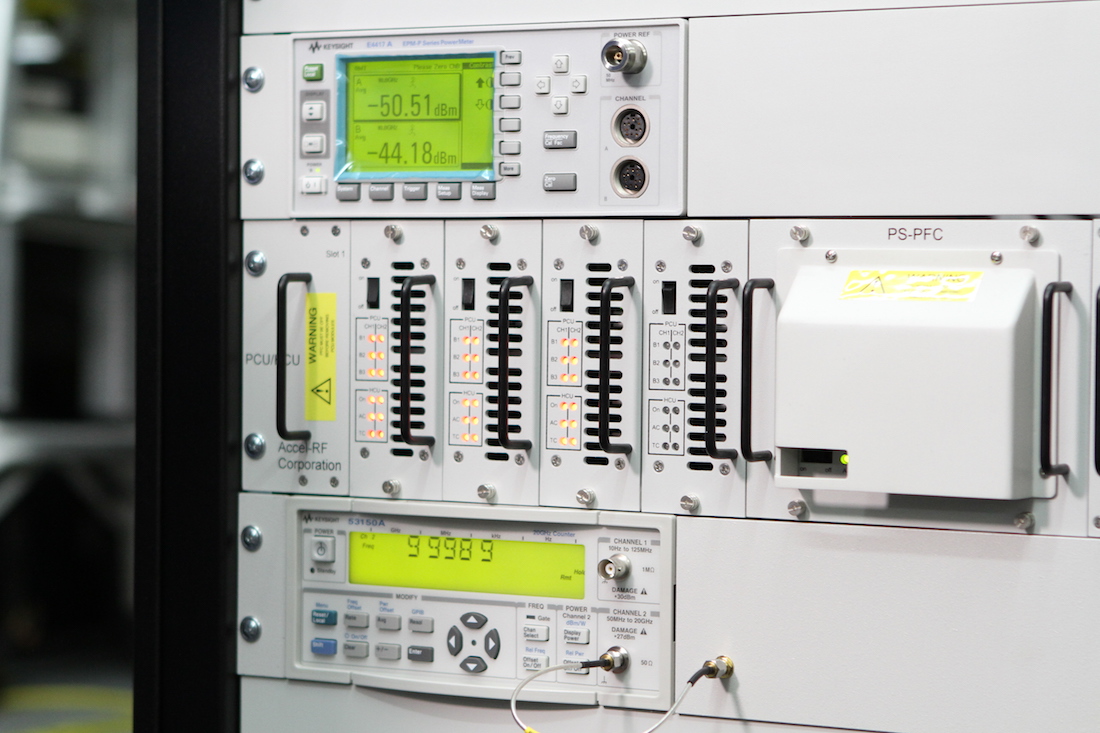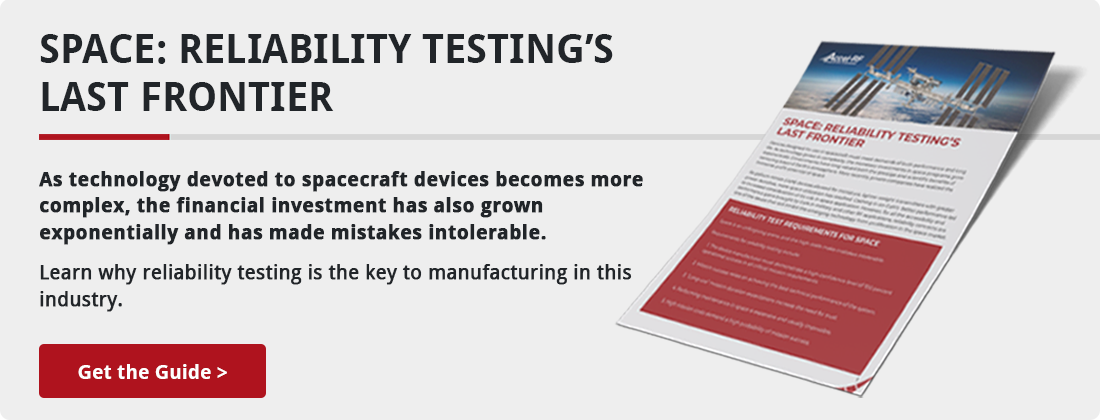
ACCEL-RF IN SPACE
The challenges of space are unique. The harsh environmental conditions and unmatched remoteness require the most reliable electronic components available. Yet, because of the numerous opportunities this environment affords, governments and private companies continue to pour billions of dollars into space exploration, earth remote sensing, and satellite communication projects.
Understandably, these organizations are always caught between wanting the latest technology and needing a proven and dependable part. Sending enormously expensive equipment beyond the reach of routine maintenance and repair tends to foster caution when selecting components and part manufacturers. The technology and the part itself must come from a qualified source.

Accel-RF’s turnkey testing solutions provide a way to meet the strict procurement requirements of the space industry. The flexible systems from Accel-RF offer a cost-effective way to create full characterization profiles and perform burn-in qualification tests to weed out weak or low-performing devices and alleviate potential system failures or lower than required performance.
Using ALT to Qualify GaN Devices for Space Application
The trend of using Gallium-Nitride (GaN) semiconductors for RF and power switching applications in space continues to grow. One reason for this is the device’s robust performance and intrinsic resistance to damage caused by extreme environmental conditions of temperature shock and high radiation levels associated with space applications.
As a prerequisite of doing business, space agencies and aerospace companies require manufacturers to provide statistically meaningful and demonstrated reliability information. However, the recent desire to use GaN devices poses the problem of a lack of availability of this meaningful data. GaN device production and fielding has just recently become available and the years of industrial testing and qualification is not yet at a level to warrant an uneasy reliability posture for space use.
In addition to putting devices through extensive space qualification mechanical tests — shock and vibration, thermocycling, exposure to radiation, etc. — manufacturers must also show their products can hold up electrically. Verifying the intrinsic reliability of the electronic design is one primary focus of Accel-RF’s testing solutions.
Accelerated Life Testing (ALT) identifies the likely limiting failure mechanisms by using extreme but controlled stresses to accelerate potential performance degradation of the device. ALT extrapolates a statistically determined life expectancy by exposing devices to high voltages and temperatures. Performing an ALT with RF is required for devices that will be used in the transmitter portion of the satellite or space system. An integrated platform of hardware controlled with embedded software from Accel-RF captures data for specific and precise stimulus that will be used to predict the useable life of the part. In turn, this data can identify the internal characteristics of the design that cause or limit the performance with age. The analysis features of the software allow users to format the data for presentation and review in typical reliability metric format. These elevated tests typically run for 2,000 to 3,000 hours to reveal the expected lifetime of the semiconductor material and device at the predicted use environment which extrapolates to approximately 20 years of operation.
Catching technology or design limitations early allows manufacturers to adjust the fabrication process or design guidelines before the device goes into full-scale production. Knowing the exact reason the device will likely fail as demonstrated by an ALT enables manufacturers to determine its performance specifications for a wide variety of different applications. Chipmakers can run tests on new designs for many intended environments. Space agencies and companies benefit from having the assurance that the component they intend to fly qualifies as a reliable design for the demands of a space application.
IMPORTANT RELIABILITY PARAMETERS OF CONCERN
DC Bias Current
Active semiconductor components require a DC power supply to operate. The DC bias voltage and current levels are critical parameters as the power dissipation of each active element will contribute to temperature rise and drive overall efficiency.
Industries:
![]()
![]()
![]()
![]()
![]()
![]()
![]()
![]()
RF Output Power
The RF output power of an amplifier drives the overall capabilities of a transmitter. The saturation level and how the output power of a device compresses with input power is used to determine which applications and systems are suitable for that device.
Industries:
![]()
![]()
![]()
![]()
![]()
![]()
![]()
RF Gain
The ratio of RF power delivered to a load relative to the input power. How gain changes and compresses as these levels rise and approach saturation is critical to designing systems for any RF application.
Industries:
![]()
![]()
![]()
![]()
![]()
Ohmic Contact Resistance
In semiconductors, this is the intrinsic resistance through the metalized terminals of the device into the channel or junction. A physical change in the ohmic contacts, which can be an effect of metal migration, can change the resistance and impact the electrical performance of a device.
Industries:
![]()
![]()
Intermodulation Distortion
IMD occurs when two signals are present in a nonlinear system, such as an amplifier. The frequency harmonics of these two signals mix and create 2nd and 3rd order intermodulation products. Measuring and mitigating these distortion levels are critical for communication applications.
Industries:
![]()
![]()
![]()
![]()
Phase Noise
Commonly referred to as “jitter”, phase noise is the random fluctuations of the phase of a signal source. It is present in oscillators and digital clocks and can have detrimental effects on a system where frequency conversion takes place. A signal with high phase noise can end up occupying more of the spectrum than intended and introduce error.
Industries:
![]()
![]()
![]()
![]()
Noise Figure
This is a critical parameter in all Receiver designs. The Noise Figure must be low for a system to be sensitive enough to detect and process weak signals. Low Noise Amplifiers (LNA) are typically the first element in a receiver and are designed to minimize Noise Figure.
Industries:
![]()
![]()
![]()
![]()
![]()
Signal Linearity
For amplifiers in RF applications, this represents the relationship between the input power and the output power of a device. At low input power levels, linearity is uniformly quantified by the gain. As input drive increases, the device gain compresses as the device saturates and the linearity characteristics change.
Industries:
![]()
![]()
![]()
![]()
![]()
Switching Response Time
The rise and fall time of RF switches used in high-frequency applications can set limitations on the bandwidth and other key aspects of a system. When used in a phased array, the switching speed can limit how quickly the beam can be steered, for example.
Industries:
![]()
![]()
![]()
![]()
Frequency Stability
This represents the ability of a source, such as an oscillator, to maintain a constant frequency output. Outside influences such as temperature and change in bias voltage can lead to drift and affect frequency stability. Stability in communication systems is required so that a signal does not drift outside of its designated band.
Industries:
![]()
![]()
![]()
![]()
![]()
![]()
The military, commercial space communications, and sensors industries are arguably the most scrutinized and historically demanding markets for confirmed, proven, demonstrable reliability assurance.
The high degree of reliability required in this market is driven by:
- Critical mission requirements and the essential need for operational success.
- The reality that mission success typically relies on achieving high technical performance of the system.
- “Long-use” mission duration expectations.
- Maintenance not being possible or easy to accomplish.
- High mission costs overall, demanding a high probability of success.
Applying Burn-In Testing to Validate Production Parts
Once designers finalize a chip design for various use applications, it is ready to go into production. The process involves preparing the semiconductor material with epitaxial growth, applications of metallic coatings, transferring the circuit design to the wafer, and packaging the known good device after wafer probe screening. Each step in the process presents the opportunity for a potential error to cause damage.
At this point, no one can afford a failure due to a mishap on the production line. The space agency or company purchasing the device must have confidence that the flight device won’t malfunction and potentially degrade or cripple millions of dollars’ worth of inaccessible equipment. The manufacturer knows that the company’s reputation as a qualified source for the supply chain and all future orders are on the line.
Burn-in testing is the solution typically chosen to validate the flight devices before use. The chip, the actual one that will eventually be going to space, undergoes a high-temperature session designed to expose excessive performance degradation and uncover a weak or defective part. The burn-in doesn’t take the chip to its end of life or damage it in the same way ALT does.
If the component is free of defects, it will survive the burn-in intact and show a performance curve associated with the family of device performance of the sample size. The confidence level is therefore high for a device that has undergone burn-in as long as its characterization data qualifies it for the intended application.
Choosing Accel-RF Means Choosing The Qualified Source for Reliability Test Compliance
Accel-RF offers a scalable testing solution with maximum flexibility. Modular design allows for customized solutions by implementing a universal test platform with complements available to add as needed for technology roadmap expansion.
Multi-channel systems enable manufacturers to test sufficient statistical sample sizes quickly. The modularity of the platform also offers the opportunity to test multiple devices for different applications simultaneously so that no downtime is carried over on a specific test plan. This arrangement supports quick design testing to get more products ready to deliver in a shorter time to market. Having many channels available makes burn-in trials go faster as well.
Organizations such as the European Space Agency (ESA), NASA, and the US Air Force have partnered with Accel-RF to test design concepts and build statistical data libraries on components intended for space applications. They’ve shown their faith in the Accel-RF testing methodology by requiring subcontractors to use Accel-RF’s equipment in projects requiring a uniform standard for acquiring reliability and performance degradation data.

Accel-RF boasts a decades-long heritage in RF device and technology qualification testing. Industry leaders turn to Accel-RF not only for testing solutions but for input on testing standards for today’s emerging technologies as well.
The rigors and costs of spaceflight demand the utmost in quality-proven components. Waiting until the end of the design process to begin reliability testing is too late. Leveraging Accel-RF’s heritage and expertise allows you to implement an accepted qualification testing program for your products. Let Accel-RF increase your capacity for consistent testing at every stage of the design and production phase of your product development cycle. Accel-RF’s industry-leading space qualification test solutions will offer you the capability to present your customers accurate reliability data and grant you permission-to-play in the final frontier — Space!
Download our guide Space: Reliability Testing’s Last Frontier
Devices designed for use in spacecraft must meet demands of both performance and long life. As technology grows in complexity, the monetary investments in space programs grow exponentially. Learn why reliability concerns are one of the issues that still inhibit the emerging technology from proliferation in the space market.
